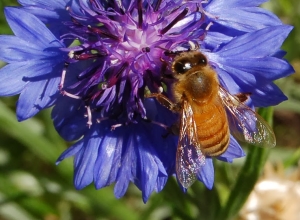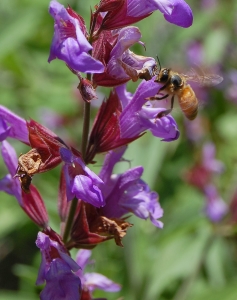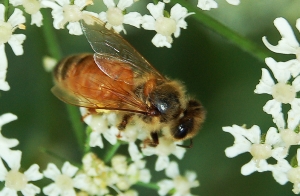Neuroscience For Kids
Where Have the Bees Gone?
Neurotoxic Insecticides May Provide a Clue
June 7, 2014
 Since the mid-2000s, the number of honey bees (Apis mellifera)
has declined significantly. Scientists are unsure what is causing the
loss of these insects that are so important to pollinating plants. New
data suggest that exposure to insecticides made with neonicotinoids may be
responsible for the loss of bees.
Since the mid-2000s, the number of honey bees (Apis mellifera)
has declined significantly. Scientists are unsure what is causing the
loss of these insects that are so important to pollinating plants. New
data suggest that exposure to insecticides made with neonicotinoids may be
responsible for the loss of bees.
Neonicotinoids are chemicals that are similar to nicotine. Insecticides made with neonicotinoids have been used since the 1980s to control insects that hurt crops. Because these chemicals are applied widely, they may affect unintended targets such as beneficial insects like bees. Neonicotinoids work on acetylcholine receptors where low doses stimulate the nervous system, but in high doses they cause paralysis and death.
 To investigate the role of neonicotinoids in honey bee death, Chensheng
Lu from the Department of Environmental Health (Harvard School of Public
Health) and Kenneth Warchol and Richard Callahan from the Worcester County
Beekeepers Association studied eighteen bee colonies in three apiaries.
At each of the three apiaries, two colonies served as controls and four
colonies were treated with neonicotinoids, so the study had a total of six
untreated control colonies and 12 neonicotinoid-treated colonies. The
neonicotinoid insecticides imidacloprid and clothianidin where placed in
the bees' drinking water.
To investigate the role of neonicotinoids in honey bee death, Chensheng
Lu from the Department of Environmental Health (Harvard School of Public
Health) and Kenneth Warchol and Richard Callahan from the Worcester County
Beekeepers Association studied eighteen bee colonies in three apiaries.
At each of the three apiaries, two colonies served as controls and four
colonies were treated with neonicotinoids, so the study had a total of six
untreated control colonies and 12 neonicotinoid-treated colonies. The
neonicotinoid insecticides imidacloprid and clothianidin where placed in
the bees' drinking water.
After 13 weeks of exposure (July to September) to the insecticides, the bees were observed by the researchers. As the outside temperature became cooler in late October, the researchers found that the size of all bee colonies decreased. However, while five of the six control colonies recovered quickly in January, six of the twelve neonicotinoid-treated colonies did not recover. In fact, 50% of the treated colonies showed signs of "colony collapse disorder." The majority of bees in neonicotinoid-treated colonies left their hives in the winter and did not return. Bees in the six treated colonies that survived were small and did not have a queen bee or young bees.
 The researchers do not know why the neonicotinoid-treated bees abandon
their hives and do not return to their hives at the end of winter and
start rearing new young. One possibility is that neonicotinoids affect
learning, memory, cognitiion and other behaviors of the bees; these
effects may alter the ability of bees to find their way back to the hive
and start rearing their young.
The researchers do not know why the neonicotinoid-treated bees abandon
their hives and do not return to their hives at the end of winter and
start rearing new young. One possibility is that neonicotinoids affect
learning, memory, cognitiion and other behaviors of the bees; these
effects may alter the ability of bees to find their way back to the hive
and start rearing their young.
References and further information:
- Insects in the City (neonicotinoid)
- Undertanding Neonicotinoid Insecticides
- Pesticide Action Network - Neonicotinoids
- AgroNews - The story of neonicotinoid insecticides
Copyright © 1996-2014, Eric H. Chudler, University of Washington
